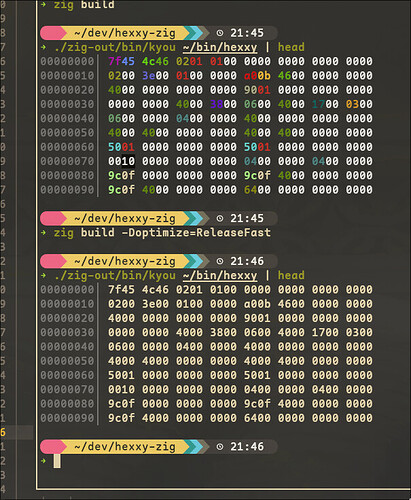Below is my Zig program built using plain zig build and below that is my program using zig build -Doptimize=ReleaseFast (and Safe or Small)
Heads up: Im new to Zig and a fairly green self-taught programmer. The tldr is that I am building a hexdump tool. I have a comptime function that creates an array of strings that contain a set of ansi colors between 0 and 256 that I would like to be available to me at runtime. I then use the current byte of the hexdump as the index of the array to retrieve the ansi colors for the corresponding byte. This outputs a colorful hexdump that I really like since I can tell at a glance that green to purple-ish text is ASCII or otherwise.
The problem I am running into is that when I build my executable with -Doptimize=ReleaseXYZ it optimizes out the color somewhere along the line.
Can someone explain why or how the color is optimized out here and would you recommend any approach to avoid this from happening or potentially a better way to solve this problem.
the code:
var ColorArray: [][]const u8 = undefined;
// const ColorArray = ComputeColor(); // cant be done
pub fn ComputeColor() [][]const u8 {
var array: [256][]const u8 = undefined;
inline for (0..256) |i| {
var full: []const u8 = "";
const lowVis: bool = (i == 0 or (i >= 16 and i <= 20) or (i >= 232 and i <= 242));
const istr: []const u8 = std.fmt.comptimePrint("{d}", .{i});
if (lowVis) {
full = "\x1b[48;5;" ++ istr ++ "m" ++ "\x1b[1;37m\x1b[38;5;255m";
} else {
full = "\x1b[38;5;" ++ istr ++ "m";
}
array[i] = full;
}
return &array;
}
fn Colorize(clr: u8) []const u8 {
return ColorArray[clr];
}
pub fn Hexxy2(fname: []const u8) !void {
// -- abbreviated for brevity
while (true) {
const n = try r.read(&line);
if (n == 0) {
break;
}
// print offset and separator
stdout.print("{s}{x:0>8}│{s} ", .{ GREY, counter, CLR }) catch |err| {
std.debug.print("{any}", .{@errorName(err)});
};
var i: usize = 0;
var line_count: usize = 0;
while (i < n) : (i += 1) {
const clr = Colorize(line[i]);
// print hex - using the hex number as the array index of ColorArray to retrieve a color
try stdout.print("{s}{x:0>2}{s}", .{ clr, line[i], CLR });
